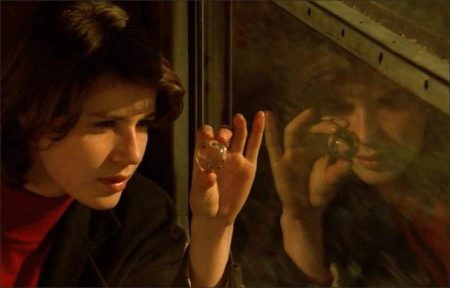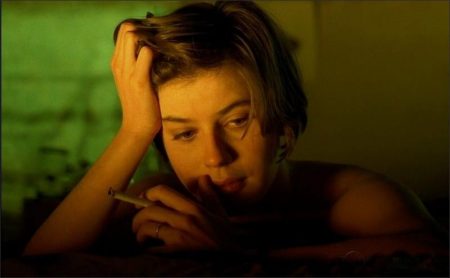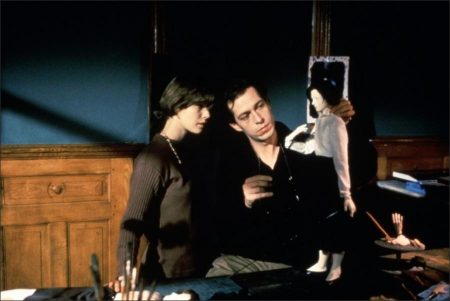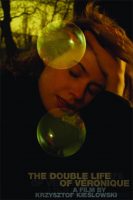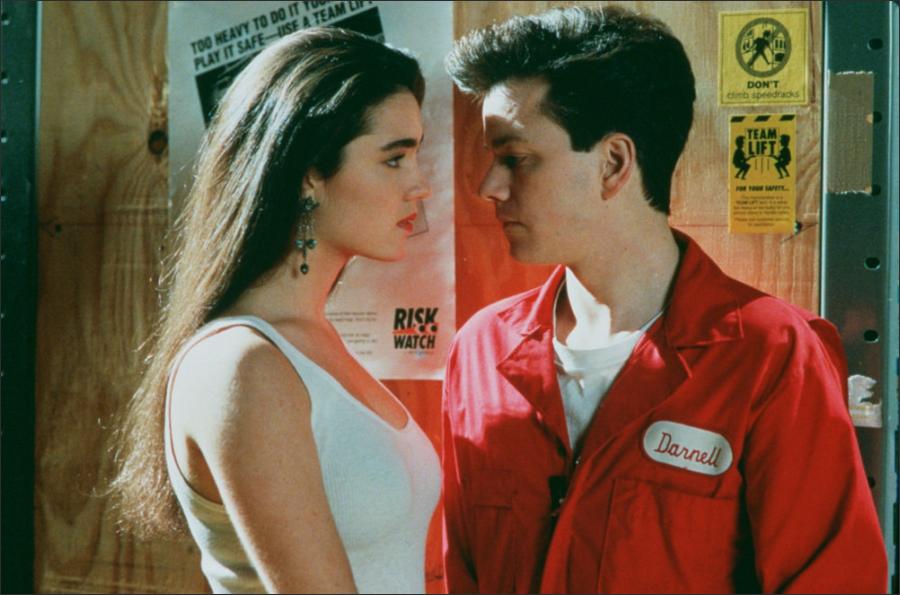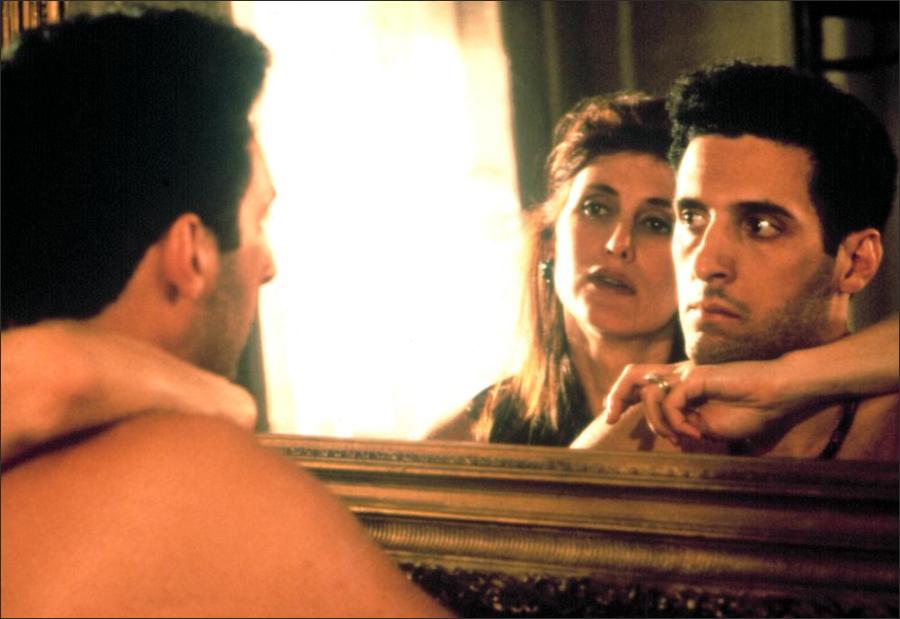The Double Life of Veronique movie storyline. In Poland in 1968, a little girl is shown the stars in the winter sky by her mother, who identifies the Christmas Eve star. In France, a little girl is shown one of the first leaves of spring by her mother, who points out the fine veins running through.
In Poland in 1990, a young Polish woman named Weronika (Irène Jacob) is singing at an outdoor concert with her choir when a sudden downpour causes the singers to rush for cover. Weronika alone continues to hold the last note while the rain falls on her smiling face. After the concert, Weronika meets her boyfriend, Antek (Jerzy Gudejko), and they go to his apartment to make love. The next day she asks her father to tell Antek she is leaving to be with her sick aunt in Kraków. She tells him that lately she feels she’s not alone in the world.
Weronika travels to Kraków by train looking out at the passing landscape through a small clear rubber ball. At her aunt’s house, Weronika talks about her boyfriend, then meets a friend at a concert rehearsal. As the choir rehearses, Weronika, who is watching offstage, accompanies them in a beautiful high soprano voice. Afterwards, the musical director asks her to audition. Overjoyed, Weronika rushes home with the sheet music.
On the way, she passes through Main Market Square, where a protest rally is in progress. One protester runs into her, causing her to drop her music folder. After retrieving the sheet music, Weronika notices a French tourist taking photos of the protestors—a young woman who looks exactly like her. Weronika smiles as she watches her double board the tourist bus that soon pulls away.
At the audition, Weronika’s singing impresses the musical director and conductor, and is later told that she won the audition. The next day, while on a trolley studying the score, Weronika notices her boyfriend Antek following on his motorbike. When they talk, she apologizes for not returning his calls, and Antek tells her he loves her. Later, while getting dressed for the concert, Weronika presses her face against a window and sees an old woman with shopping bags slowly making her way along the street. That night during the concert, while singing a solo part, Weronika collapses onstage and dies—her spirit passing over the audience.
In Paris that day, a young French woman named Véronique (Irène Jacob), after making love with her former boyfriend, is overwhelmed with sadness, as if she were grieving. The next day, at the school where she teaches music, Véronique attends a marionette performance with her class. During the performance—a story about a ballet dancer who breaks her leg and then turns into a butterfly—Véronique watches the puppeteer controlling the marionettes.
Back in her classroom, she leads her class in a musical piece by an eighteenth-century composer, Van den Budenmayer—the same piece performed by Weronika when she died. That night while driving home, she sees the puppeteer at a traffic light motioning to her not to light the wrong end of her cigarette. Later she is awakened by a phone call with no one speaking, but in the background she hears a choir singing the music of Van den Budenmayer.
The Double Life of Veronique (French: La double vie de Veronique, Polish: Podwójne życie Weroniki) is a 1991 French-Polish-Norwegian drama film directed by Krzysztof Kieślowski and starring Irène Jacob. Written by Kieślowski and Krzysztof Piesiewicz, the film explores the themes of identity, love, and human intuition through the characters of Weronika, a Polish choir soprano, and her double, Véronique, a French music teacher. The two women do not know each other, and yet they share a mysterious and emotional bond that transcends language and geography.
The Double Life of Veronique is notable for Sławomir Idziak’s innovative cinematography and Zbigniew Preisner’s operatic score. The film was Kieślowski’s first to be produced partly outside his native Poland. It won the Prize of the Ecumenical Jury and the FIPRESCI Prize at the 1991 Cannes Film Festival for Krzysztof Kieslowski, and the Best Actress Award for Irène Jacob. The Double Life of Veronique was selected as the Polish entry for the Best Foreign Language Film at the 64th Academy Awards, but was not accepted as a nominee.
Awards and Nominations
1991 Cannes Film Festival Prize of the Ecumenical Jury (Krzysztof Kieślowski) Won
1991 Cannes Film Festival FIPRESCI Prize (Krzysztof Kieślowski) Won
1991 Cannes Film Festival Award for Best Actress (Irène Jacob) Won
1991 Cannes Film Festival Nomination for the Golden Palm (Krzysztof Kieślowski)
1991 Los Angeles Film Critics Award for Best Music (Zbigniew Preisner) Won
1991 Warsaw International Film Festival Audience Award (Krzysztof Kieślowski) Won
1992 César Awards Nomination for Best Actress (Irène Jacob)
1992 César Awards Nomination for Best Music Written for a Film (Zbigniew Preisner)
1992 Golden Globe Awards Nomination for Best Foreign Language Film
1992 Guldbagge Awards Nomination for Best Foreign Film
1992 Independent Spirit Awards Nomination for Best Foreign Film
1992 National Society of Film Critics Award for Best Foreign Language Film Won
The Double Life of Veronique movie trailer.
The Double Life of Veronique (1991)
Directed by: Krzysztof Kieslowski
Starring: Irène Jacob, Philippe Volter, Sandrine Dumas, Aleksander Bardini, Louis Ducreux, Claude Duneton, Halina Gryglaszewska, Kalina Jędrusik, Wladyslaw Kowalski
Screenplay by: Krzysztof Kieślowski, Krzysztof Piesiewicz
Production Design by: Patrice Mercier
Cinematography by: Slawomir Idziak
Film Editing by: Jacques Witta
Costume Design by: Laurence Brignon, Claudia Fellous, Elzbieta Radke
Makeup Department: Iwona Maria Karpinska, Jolanta Stachecka, Agnès Tassel
Music by: Zbigniew Preisner
Distributed by: Sidéral Films (France)
Release Date: May 15, 1991
Hits: 365
